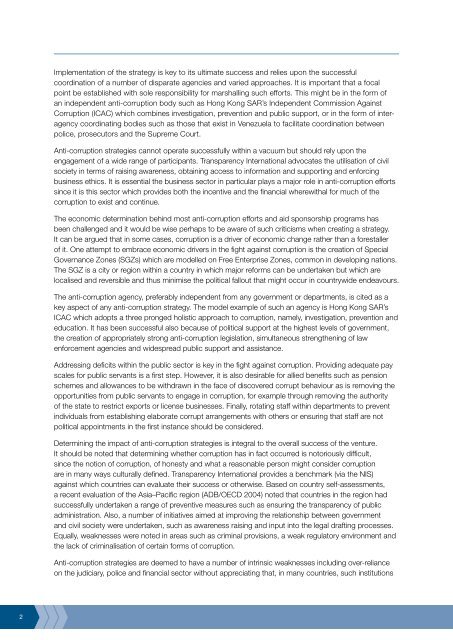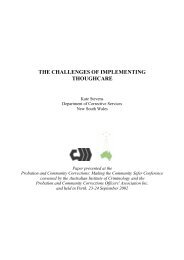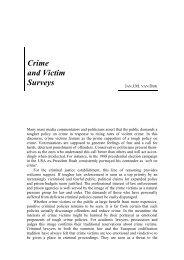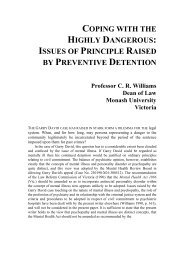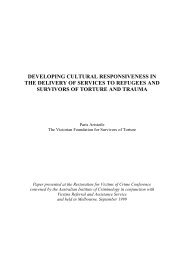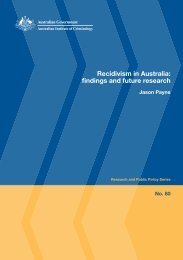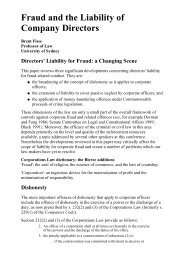Review of anti-corruption strategies Rob McCusker - Australian ...
Review of anti-corruption strategies Rob McCusker - Australian ...
Review of anti-corruption strategies Rob McCusker - Australian ...
Create successful ePaper yourself
Turn your PDF publications into a flip-book with our unique Google optimized e-Paper software.
Implementation <strong>of</strong> the strategy is key to its ultimate success and relies upon the successful<br />
coordination <strong>of</strong> a number <strong>of</strong> disparate agencies and varied approaches. It is important that a focal<br />
point be established with sole responsibility for marshalling such efforts. This might be in the form <strong>of</strong><br />
an independent <strong>anti</strong>-<strong>corruption</strong> body such as Hong Kong SAR’s Independent Commission Against<br />
Corruption (ICAC) which combines investigation, prevention and public support, or in the form <strong>of</strong> interagency<br />
coordinating bodies such as those that exist in Venezuela to facilitate coordination between<br />
police, prosecutors and the Supreme Court.<br />
Anti-<strong>corruption</strong> <strong>strategies</strong> cannot operate successfully within a vacuum but should rely upon the<br />
engagement <strong>of</strong> a wide range <strong>of</strong> participants. Transparency International advocates the utilisation <strong>of</strong> civil<br />
society in terms <strong>of</strong> raising awareness, obtaining access to information and supporting and enforcing<br />
business ethics. It is essential the business sector in particular plays a major role in <strong>anti</strong>-<strong>corruption</strong> efforts<br />
since it is this sector which provides both the incentive and the financial wherewithal for much <strong>of</strong> the<br />
<strong>corruption</strong> to exist and continue.<br />
The economic determination behind most <strong>anti</strong>-<strong>corruption</strong> efforts and aid sponsorship programs has<br />
been challenged and it would be wise perhaps to be aware <strong>of</strong> such criticisms when creating a strategy.<br />
It can be argued that in some cases, <strong>corruption</strong> is a driver <strong>of</strong> economic change rather than a forestaller<br />
<strong>of</strong> it. One attempt to embrace economic drivers in the fight against <strong>corruption</strong> is the creation <strong>of</strong> Special<br />
Governance Zones (SGZs) which are modelled on Free Enterprise Zones, common in developing nations.<br />
The SGZ is a city or region within a country in which major reforms can be undertaken but which are<br />
localised and reversible and thus minimise the political fallout that might occur in countrywide endeavours.<br />
The <strong>anti</strong>-<strong>corruption</strong> agency, preferably independent from any government or departments, is cited as a<br />
key aspect <strong>of</strong> any <strong>anti</strong>-<strong>corruption</strong> strategy. The model example <strong>of</strong> such an agency is Hong Kong SAR’s<br />
ICAC which adopts a three pronged holistic approach to <strong>corruption</strong>, namely, investigation, prevention and<br />
education. It has been successful also because <strong>of</strong> political support at the highest levels <strong>of</strong> government,<br />
the creation <strong>of</strong> appropriately strong <strong>anti</strong>-<strong>corruption</strong> legislation, simultaneous strengthening <strong>of</strong> law<br />
enforcement agencies and widespread public support and assistance.<br />
Addressing deficits within the public sector is key in the fight against <strong>corruption</strong>. Providing adequate pay<br />
scales for public servants is a first step. However, it is also desirable for allied benefits such as pension<br />
schemes and allowances to be withdrawn in the face <strong>of</strong> discovered corrupt behaviour as is removing the<br />
opportunities from public servants to engage in <strong>corruption</strong>, for example through removing the authority<br />
<strong>of</strong> the state to restrict exports or license businesses. Finally, rotating staff within departments to prevent<br />
individuals from establishing elaborate corrupt arrangements with others or ensuring that staff are not<br />
political appointments in the first instance should be considered.<br />
Determining the impact <strong>of</strong> <strong>anti</strong>-<strong>corruption</strong> <strong>strategies</strong> is integral to the overall success <strong>of</strong> the venture.<br />
It should be noted that determining whether <strong>corruption</strong> has in fact occurred is notoriously difficult,<br />
since the notion <strong>of</strong> <strong>corruption</strong>, <strong>of</strong> honesty and what a reasonable person might consider <strong>corruption</strong><br />
are in many ways culturally defined. Transparency International provides a benchmark (via the NIS)<br />
against which countries can evaluate their success or otherwise. Based on country self-assessments,<br />
a recent evaluation <strong>of</strong> the Asia–Pacific region (ADB/OECD 2004) noted that countries in the region had<br />
successfully undertaken a range <strong>of</strong> preventive measures such as ensuring the transparency <strong>of</strong> public<br />
administration. Also, a number <strong>of</strong> initiatives aimed at improving the relationship between government<br />
and civil society were undertaken, such as awareness raising and input into the legal drafting processes.<br />
Equally, weaknesses were noted in areas such as criminal provisions, a weak regulatory environment and<br />
the lack <strong>of</strong> criminalisation <strong>of</strong> certain forms <strong>of</strong> <strong>corruption</strong>.<br />
Anti-<strong>corruption</strong> <strong>strategies</strong> are deemed to have a number <strong>of</strong> intrinsic weaknesses including over-reliance<br />
on the judiciary, police and financial sector without appreciating that, in many countries, such institutions


